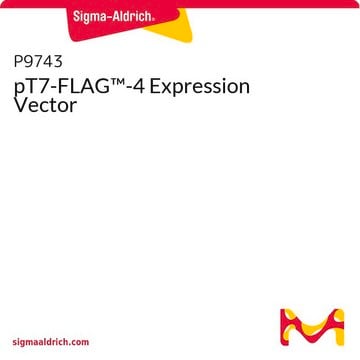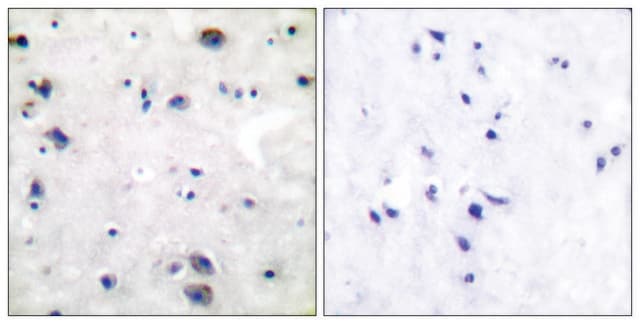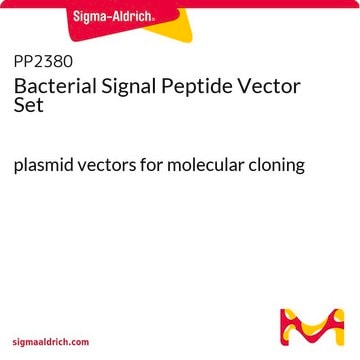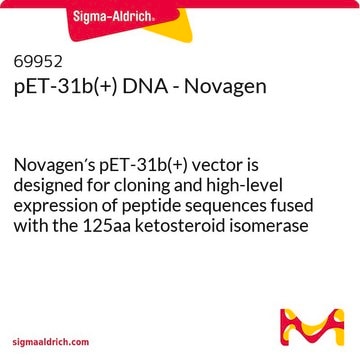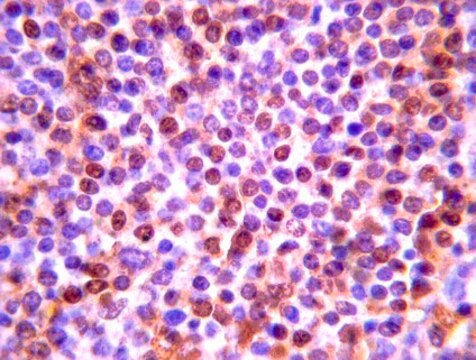推荐产品
籤條
6-His tagged
形狀
buffered aqueous solution
分子量
size 6189 bp
菌種選擇
kanamycin
哺乳動物細胞選擇
puromycin
複製起點
pUC (500 copies)
肽切割
TEV
肽標籤位置
C-terminal
啟動子
Promoter name: CMV
Promoter activity: constitutive
Promoter type: mammalian
報告基因
none
運輸包裝
ambient
儲存溫度
−20°C
一般說明
This plasmid is designed to express tagged proteins in mammalian cells either by transient transfection or by creating stable cell lines. It contains a puromycin resistance expression cassette using the human Ubiquitin promoter to drive expression and allow for the selection of cells containing the plasmid.
About the Peptide Tag:This plasmid contains a c-terminal Hexa-Histidine (6His) affinity tag that can be fused to a gene of interest to allow protein detection and/or purification. The sequence of the tag is: HHHHHH.
About the Cleavage Tag:This plasmid also encodes a protease cleavage site that is designed to be positioned between your gene of interest and the tag to allow the removal of the tag following protein purification or isolation. This plasmid contains a TEV cleavage tag. The protein sequence of the cleavage tag is: ENLYFQG. Cleavage occurs between the Glu and Gly residues. TEV is often reported to have better specificity for its recognition site compared to EKT Thrombin or Faxtor Xa.
Promoter Expression Level: This plasmid contains the mammalian CMV promoter to drive gene expression. We have tested all of our mammalian promoters in a range of cell types and CMV is consistently the strongest in those we have studied. However there are many reports of the CMV promoter demonstrating silencing by methylation in long-term culture.
About the Peptide Tag:This plasmid contains a c-terminal Hexa-Histidine (6His) affinity tag that can be fused to a gene of interest to allow protein detection and/or purification. The sequence of the tag is: HHHHHH.
About the Cleavage Tag:This plasmid also encodes a protease cleavage site that is designed to be positioned between your gene of interest and the tag to allow the removal of the tag following protein purification or isolation. This plasmid contains a TEV cleavage tag. The protein sequence of the cleavage tag is: ENLYFQG. Cleavage occurs between the Glu and Gly residues. TEV is often reported to have better specificity for its recognition site compared to EKT Thrombin or Faxtor Xa.
Promoter Expression Level: This plasmid contains the mammalian CMV promoter to drive gene expression. We have tested all of our mammalian promoters in a range of cell types and CMV is consistently the strongest in those we have studied. However there are many reports of the CMV promoter demonstrating silencing by methylation in long-term culture.
序列
To view sequence information for this product, please visit the product page
分析報告
To view the Certificate of Analysis for this product, please visit www.oxgene.com
相關產品
产品编号
说明
价格
儲存類別代碼
12 - Non Combustible Liquids
閃點(°F)
Not applicable
閃點(°C)
Not applicable
Alexander C Cerny et al.
PLoS genetics, 11(10), e1005578-e1005578 (2015-10-29)
Recycling of signaling proteins is a common phenomenon in diverse signaling pathways. In photoreceptors of Drosophila, light absorption by rhodopsin triggers a phospholipase Cβ-mediated opening of the ion channels transient receptor potential (TRP) and TRP-like (TRPL) and generates the visual
Geoffrey M Lynn et al.
Nature biotechnology, 33(11), 1201-1210 (2015-10-27)
The efficacy of vaccine adjuvants such as Toll-like receptor agonists (TLRa) can be improved through formulation and delivery approaches. Here, we attached small molecule TLR-7/8a to polymer scaffolds (polymer-TLR-7/8a) and evaluated how different physicochemical properties of the TLR-7/8a and polymer
Diana Romero et al.
Carcinogenesis, 37(1), 18-29 (2015-10-28)
Dickkopf-3 (Dkk-3) is a secreted protein whose expression is downregulated in many types of cancer. Endogenous Dkk-3 is required for formation of acini in 3D cultures of prostate epithelial cells, where it inhibits transforming growth factor (TGF)-β/Smad signaling. Here, we
Jin-Gyoung Jung et al.
PLoS genetics, 10(10), e1004751-e1004751 (2014-10-31)
The Notch3 signaling pathway is thought to play a critical role in cancer development, as evidenced by the Notch3 amplification and rearrangement observed in human cancers. However, the molecular mechanism by which Notch3 signaling contributes to tumorigenesis is largely unknown.
我们的科学家团队拥有各种研究领域经验,包括生命科学、材料科学、化学合成、色谱、分析及许多其他领域.
联系技术服务部门
